Are Photography Conventions Still Relevant?
![]()
The alarm on my phone sounds at 4 am. For a few bleary seconds I think, this can’t be right…but then it hits me: I have a plane to catch. Not only me, but my wife, our four kids, and my mother-in-law need to cram ourselves and all our bags into the minivan and be on the road by 4:45 am. We are headed to St. Louis for my last photography conference of the year: Shutterfest.
The Rise and Fall of Conferences
If you weren’t around the photography industry at the time, 2009 was the peak of photo conference madness. WPPI, ImagingUSA, PhotoPlus, and more were all at the peak of their popularity. Social media was in its infancy and going to live events was pretty much the best and only way to get photography education.
Coincidentally, 2009 was a massive year for Imaging USA. Despite the global financial crisis, The Gaylord Opryland was brimming with ten thousand professional photographers and enthusiasts who were there to learn, party, and spend their hard-earned money on the latest gear at one of the largest photography expos in the world.
I still remember how it felt: like one gigantic magic show. You gotta remember that we were new. So new, in fact, that we didn’t even know what we didn’t know. We walked into our first class, wedding photography taught by Jerry Ghionis. If you’ve ever seen Jerry, you know that as far as first classes go, you can’t do much better than that. The following three days flew by and we left exhausted, elated, and hopeful that we might just be able to make it as professional photographers. We had found our people.
An awful lot happened in the following years. I could write a book about the rise of YouTube and social media, the advancements in digital technology, the flood of new photographers, and a dozen other things that combined to cause such a sea change in professional photography. What matters the most as it pertains to this article is the monumental shift over the last 14 years in how people learn.
Almost anything you want to know, you can find online. How to change a headlight on a 1996 Honda Civic or what’s the best tripod for landscape photographers are a few keystrokes away, 24 hours a day. You can attend lighting and posing webinars, buy photo business masterclasses, or even be mentored by a famous photographer from the comfort of your favorite chair. So as I sit on this cramped flight to St. Louis, on my way to my fourth and final conference of the year, I ask myself: why does anyone do this? What is the value? In the modern era, what is the point of the photography convention?
Full disclosure, I am a speaker at pretty much every conference I attend. That’s right, I get paid to go. Not only that, but I am usually selling something and making money from that too. You might say that incentivizes me to write an article talking about how great conferences are, right? Well before you make that judgment, let me tell you a secret: I make ten times the money from webinars and online classes that I can give from my studio, sitting at my desk.
Teaching at photography conferences is the worst return on investment in my business. If another photographer came to me with the same numbers, based only on the financial outlook, I would tell them to quit the conferences and focus on their online business. So, yes I make money at conferences but, no, it’s not all that much. So having that out in the open, I want to make a case both against and for the photography convention.
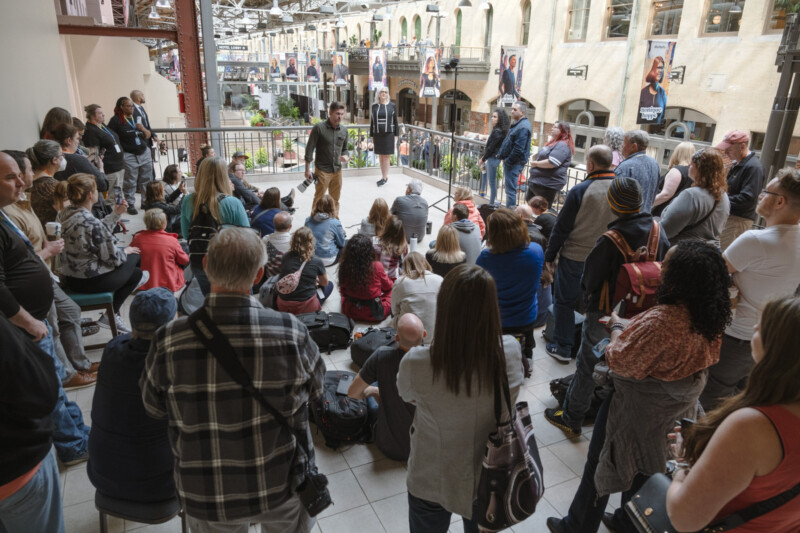
Why NOT to Go to a Photo Conference
Let me start with reasons not to go to a conference:
1. It’s Expensive. No matter what the registration price is, or how many convention hacks you know to save money, going to a photography conference costs a lot of money. Not only do you have all of the obvious travel expenses, but you are taking yourself out of your own business for days at a time, which can cost you way more than you would spend on attending. When we went for the first time, we stayed miles away from the host hotel in a Travel Lodge and even left the convention center for meals (which we always shared) to save money. It’s not hard to imagine how the expense of traveling could limit access to conventions for those who might need them the most.
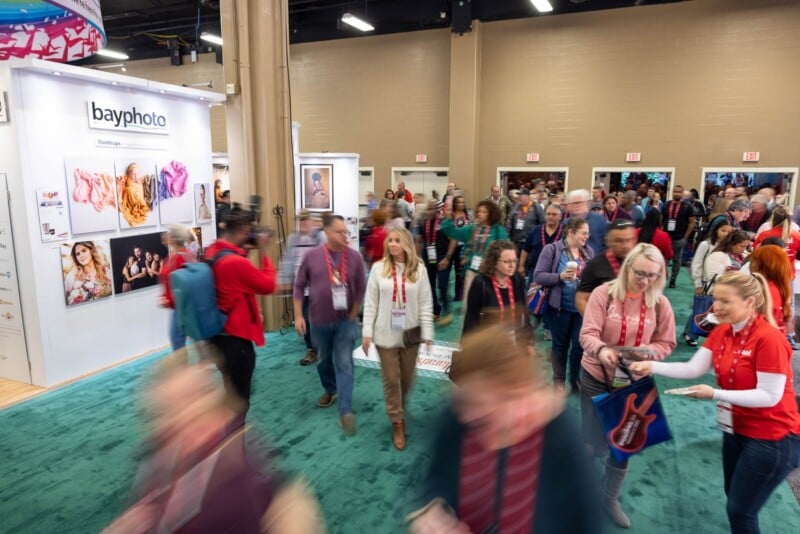
2. Online Education is Great Now. From Facebook support groups to YouTube tutorials, the amount of online photography education is staggering. Although there is a lot of half-baked and bad information online, a diligent student can eventually find quality educators putting out great content. Content that can help navigate everything from what gear to buy to how to retouch a portrait. Having on-demand access to almost anything you could want to know is faster, more affordable, and preferable to flying across the country and trying to navigate a conference with thousands of photographers and waiting in long lines for over-priced coffee.
3. It’s Scary. If you are even moderately introverted, a massive, crowded convention center or hotel can be a waking nightmare. A hundred thousand square feet of walking, talking meat sacks all smiling and hugging, breathing all over everything. Not ideal. So much nicer to just cruise YouTube from underneath a weighted blanket.
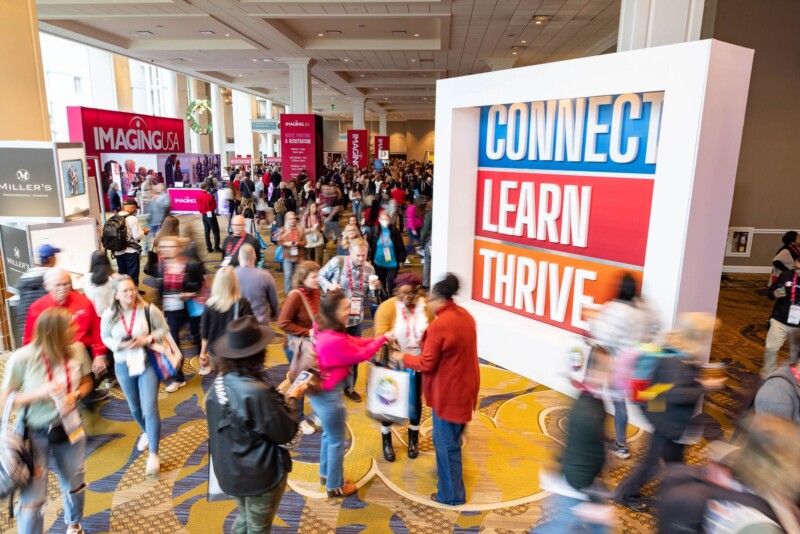
In and of themselves, those are pretty compelling reasons not to go to photography conferences, but believing you have to choose between online and in-person education is a false dichotomy. You don’t actually have to choose, do you? Different types of education serve you in their own way at different times in your development. If you’re an old hand like me, you might have come up learning the old-fashioned way but still take advantage of the newer ways to grow. If you came up after the advent of online learning, you might learn and grow in new ways by taking the leap and going to a live event. There is no either/or, just what fits you best at the time.
Why to Go to a Photo Conference
If you are questioning the validity of attending live events, though, allow me to make a case for them by telling you why I think they still matter, maybe more than ever.
1. There Are Things You Can’t Learn or Do Online. Being in a room with an expert is very different from watching them on a screen. Yes, that’s a pretty obvious statement, but let me expound on that. Online education is edited, it’s curated, and it’s not always honest. Watching an instructor who has the chops to pull off a live tutorial while fielding questions is still kind of a magic show. And what about those questions? Instead of leaving a comment and hoping that someone gets back to you, the instructor is in the room and they can address you right then and there. That type of access isn’t common online. If you pick the right event and instructors, it can be game-changing.

2. Business Education Almost Doesn’t Exist Online. Have you looked around the online photography education space and noticed anything missing? Business education, real numbers, and actionable business practices are pretty much nonexistent or behind a paywall. There are a couple of good reasons for that: Educators are either not actually making that much money or they aren’t open to sharing their business secrets without getting paid.
How do I know? I do it myself.
That’s right: if you want to know how I make money and the things I do to keep making money you are gonna have to pay. It’s pointless for me or anyone else in the space to share our money-making secrets openly because that information is wasted on anyone but the most serious students. If you are committed to succeeding at your business, you will put your money where your mouth is. Here’s the exception: conferences.
That’s right! Conferences like ImagingUSA, WPPI, Shutterfest, SWPP, and the Portrait Masters all have plenty of classes dedicated to the business of photography and how to be a better entrepreneur. Instructors like me very often save their business education for their paid coaching or in-person classes. You want someone to open up their books to you and tell you how to make a living? Whether that’s an expensive online course or an expensive trip to a conference, you usually gotta pay and, you know what? I don’t think there’s much wrong with that.
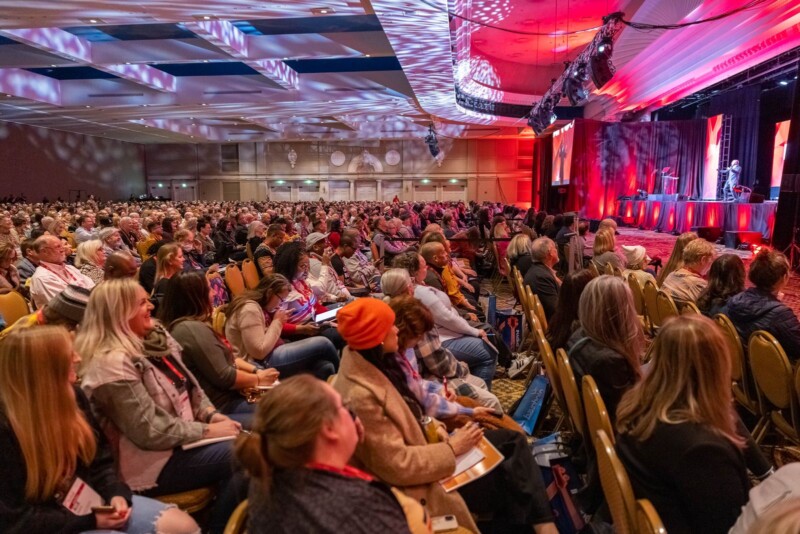
3. The Instructors Aren’t Even the Best Education at a Conference. This one’s a big one. After 15 years of attending most of the big conferences, I can tell you without any hesitation that I have learned more at the bar than anywhere else. I’m talking about what the corporate world calls “hallway conversations”. Sitting for an hour with someone who works for Canon over a coffee or sharing a jug of sangria with a 20-year veteran from the other side of the country is transformative. Just talking shop with other photographers in a real-time, casual setting yields the kind of information that’s the most important to your day-to-day.
Ironically, that unwritten knowledge is also the type of information that no one would bother to make a video about. From finding out why your camera does that weird thing to discovering the secret to getting your pop-up background to sit right, there are a thousand small pieces of information you will collect while you meet people. Get a candid review of a piece of software or an album company from someone who has used it for a decade in their business. Discover what the most comfortable socks are to wear on a wedding day. The type of tape someone uses to make dress collars stand up right. It’s honestly mind-blowing what you will learn from real photographers who are out there doing it when you just sit down and share. Online education doesn’t have this, not even close.
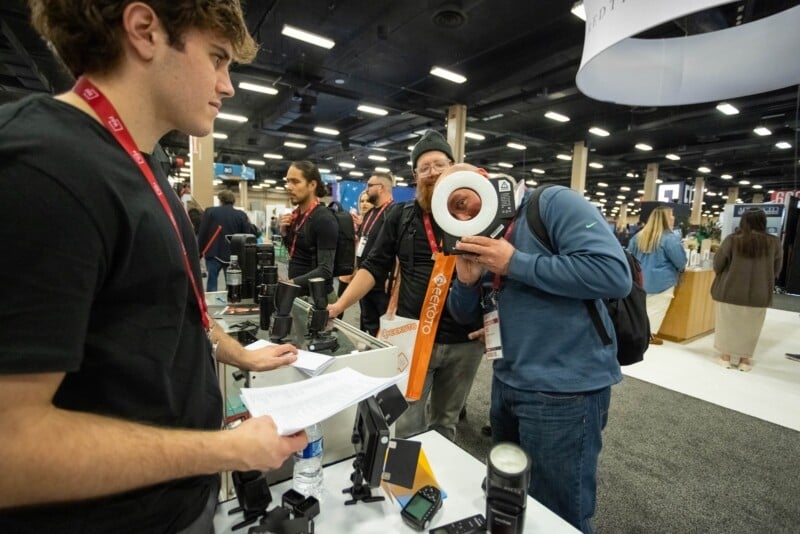
4. Photography Can Be a Lonely Business, Most of Us Are Solo Acts. People in most “normal” jobs have co-workers, people to share those hallway conversations with and exchange that unwritten knowledge. Facebook groups are great, Reddit has loads of interesting ideas, and I learn a ton of tips and tricks from TikTok in 10-second bursts, but it doesn’t help me not need people. It doesn’t fill the need for support from others who understand what I’m going through in my job. There is a special way we relate to people that work in our same field.
It’s impossible to overstate the number of kind and generous photographers who have shared their experiences with Julie and me to help us along. Almost every single one of them we met at a conference. Some of our dearest friends in the industry are scattered all over the country (and other countries). No matter what I’m working on, no matter what I need, no matter what time of day, there is a colleague just a Zoom call away. When my dad had a heart attack about 8 years ago and my family was rushing to the hospital, we had a wedding on the books for the next day. One phone call and it was covered by a photographer from our state PPA affiliate. Someone who I met at a conference.
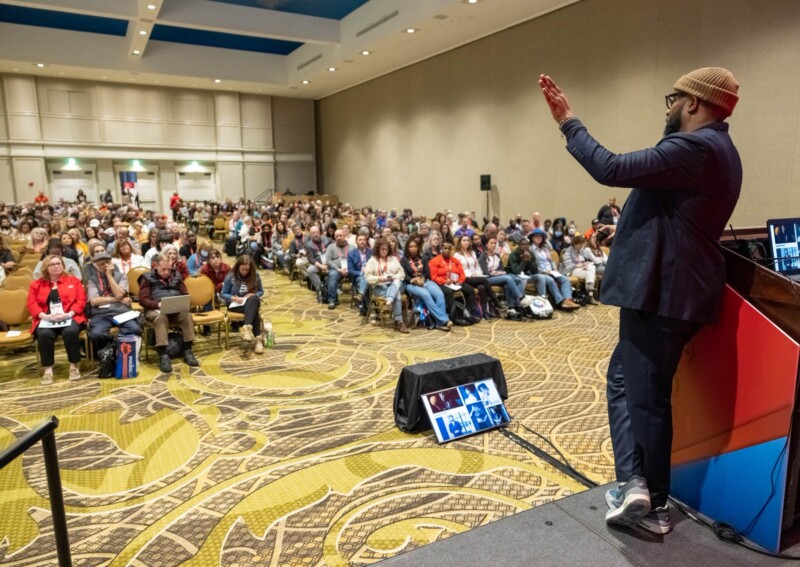
There are other reasons. Getting hands-on with the latest gear, trade show discounts, crazy styled shoots, and big parties, each end every point a worthy one. Those just aren’t my reasons. This past year saw a healthy resurgence in the number of attendees at some of the tentpole photography conferences like IUSA and WPPI. I think, in part, it was due to lingering pent-up demand from the pandemic; people just felt ready to get out and be around others after three years of keeping their distance. My hope is that the trend continues and we get to see another golden era of photography conventions because, as expensive, crazy, and a little gross as they are, I am confident that without them, I wouldn’t have the career or the friends I have today.
About the author: Gary Hughes is a commercial photographer based in Florida. The opinions expressed in this article are solely those of the author. You can find more of his work on his website.